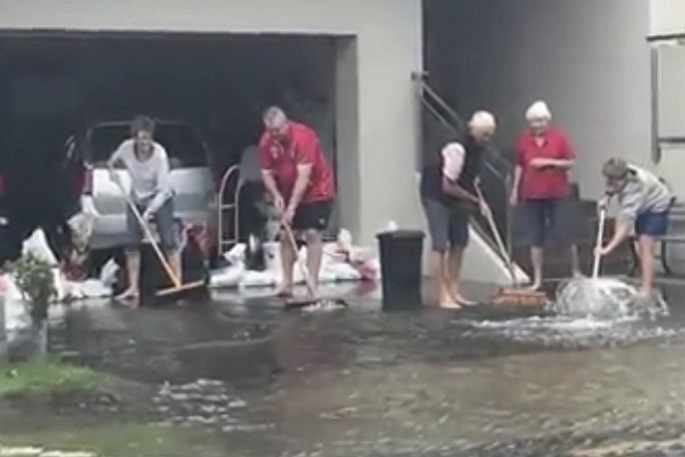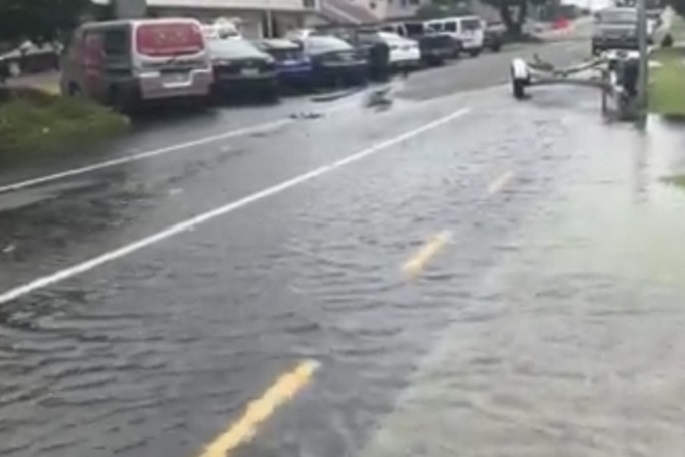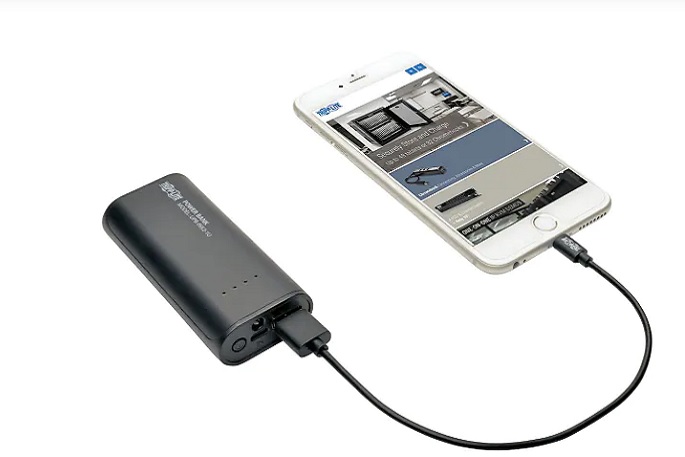Living in a block of apartments where other residents include engineers, builders, health practitioners, filmmakers and computer nerds means that when it comes to a major storm, everyone around me usually has things sorted when it comes to their "electrics".
We've been through flooding, power cuts and quakes. Some of us have lost all our household appliances due to power surges. We've sandbagged our front doors and driveways and dug out blocked drains, rescued neighbours' cars and stood laughing in knee-deep water in the middle of the street.
These days we don't have the same problem with flooding that we once had, as Tauranga City Council did some marvellous upgrade work on our street culverts a few years back. But it's normal to always have one eye on the weather when you're living near a beach. And it's "normal life" to have power surge guards.

Neighbours on my street in Tauranga helping each other with sandbags in the 2018 flooding. Photo: Screenshot/Rosalie Liddle Crawford.
Ahead of a storm one neighbour, who is very appreciated, habitually climbs onto the roofs and checks and cleans out everyone's gutters of debris. We all tend to keep an eye on the road culverts, and at the end of our street, we watch to see that the stormwater pipe isn't buried again in sand.
Ahead of Cyclone Gabrielle arriving I called out to the engineer neighbour from my balcony.
"Hey, you all ready for the weather tomorrow? We're getting a bit of weather."
"Yep. I've been up and cleared out your gutters and the others' gutters. Brought my barbecue indoors off the balcony so I can cook on it. Have you got your power packs charged?"

That time in 2018 when my street got flooded again. Photo: Screenshot/Rosalie Liddle Crawford.
It struck me in that moment what 'techno-geeks' we have become, and not overly concerned if there's a power cut, although it can be "madness" running around trying to find my ICP number when reporting a power cut to my power supplier. Why haven't I written it down on a list and saved it on my phone?
Most of my friends have power packs that are useful for travelling or powering up your mobile phone if you're away all day. We also have learned the hard way that it's important to go around the house and pull out the power cord of every appliance from the wall prior to a storm, apart from the fridge of course.

Power packs are useful for having a back-up power supply. Photo: Supplied.
I nearly started to make a list of what to do in a power cut but noticed that PowerCo are providing tips to help people be prepared for an outage.
"We understand any power outage – whether caused by a storm, vehicle accident, or we need to disconnect your electricity supply for maintenance or upgrade – can be inconvenient," says a PowerCo spokesperson.
"Being prepared and having a plan for your home or business will help you manage until the power is back on."
Here are some tips from PowerCo to help us all prepare for a power outage:
Know where to locate your ICP number
No power? Log a fault with your electricity retailer – that's the company you pay your power bill to. So they can log the job, they'll need your ‘ICP number'. It's the unique number for your power connection, which you can find on your electricity bill.
Keep a torch, battery powered lantern and spare batteries handy
A battery powered torch or lantern not only helps light up the night but are safer to use than candles and matches.
Protect electronics with surge devices
If the power goes out, it's good to know your expensive electronics are protected. A surge protection device will help protect the likes of your TV, computer and other electronic appliances from damage.
Keep your fridge and freezer closed
Keep the cold in by keeping your fridge and freezer shut. Most freezers will keep food at a safe temperature for up to 24 hours, so long as the door stays closed.
Switch off sensitive appliances
Switch off sensitive electronic appliances such as computers and TVs. These can be affected by a power surge when the electricity comes back on.
Have a supply of emergency water
Water pumps in rural areas may not work when the power is out. Make sure you store emergency water supplies for drinking and washing. If you're notified of a planned outage, keep buckets of water nearby on the day for flushing the toilet.
Consider a spare battery or mobile power pack
Make sure you fully charge your devices regularly and consider having a spare battery or mobile power pack. Your wifi and cordless landline phones will likely be affected in an outage, so having a back-up communications plan is important. You may be able to use your mobile phone to create a wifi hotspot. You can create your mobile hotspot from the settings of your phone (eg using a mobile phone to create a wifi hotspot).
Consider a back-up generator
If you run a business, consider a back-up generator as part of your business contingency planning. Then, even if the power is out, you can keep operating as usual.
Know how to override garage doors
Your vehicle doesn't need to be stuck in the garage if there's a power cut. If you have electric doors on your garage or live in an electrically gated area, it's a good idea to learn how to manually override them before there's a power cut. For many garage doors, look for the red cord, pull it down firmly until it clicks, then walk over to the door to push it up manually. Don't try to pull the door using the manual release cord – it will snap under the load.
Ensure your barbecue is ready to go
Make sure the gas is topped up for your barbecue or camping stove. That way you can continue to prepare hot food for your family.
Switch off appliances
If the power goes out, turn off appliances in use, such as heaters, stove tops, kettles and ovens, so they don't come on straight away when your power comes back on.
Medically dependent on power?
If you or someone in your household is medically dependent on power, check with your doctor and your energy retailer (the company you pay your power bill to) to ensure your back up plan is up to date.



0 comments
Leave a Comment
You must be logged in to make a comment.